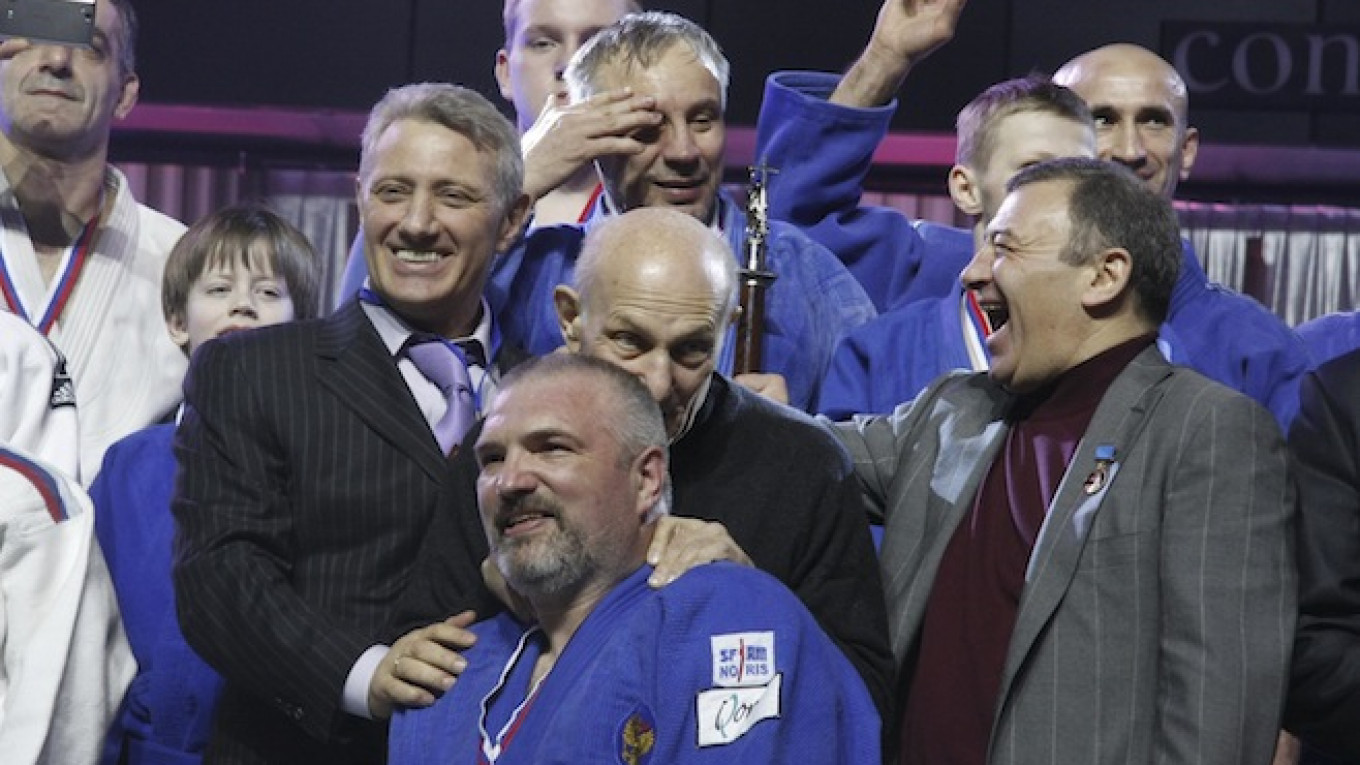Fortune has smiled on judo coach Arkady Rotenberg, bringing his businesses Google-like growth and a key role in staging the Winter Olympics. It has now brought down on him the wrath of the U.S. government.
Rotenberg says his success has nothing to do with personal favors from his childhood sparring partner and Russian President Vladimir Putin, and has denounced this week's Ukraine-linked sanctions on his companies as an affront to the spirit of free enterprise.
Following personal U.S. visa bans and asset freezes imposed on Rotenberg and his younger brother Boris last month, the new measures against pipeline construction firm Stroigazmontazh, or SGM, and banks SMP and InvestCapitalBank have, if nothing else, thrust the media-shy sportsman into the spotlight.
SGM, 51-percent owned by Arkady Rotenberg, saw revenues grow by a factor of nearly 50 after its creation in 2008 from several units sold by Gazprom. In four years, working for the state-run energy giant and others, it had laid 11,600 kilometers of pipeline — enough to reach all the way from his and Putin's native St. Petersburg to the Pacific. And back.
SMP, in which he and his brother each have a 38-percent stake, has also done well. With assets of 208 billion rubles ($5.8 billion) and about 100 branches it stands only 35th on a ranking by Interfax. But with assets growing 52 percent in the year, it is one of the fastest growing banks in Russia.
In a rare interview in 2012, he told Forbes, which puts his current wealth at $4 billion, that Putin did him no favors in securing public contracts: "Vladimir Vladimirovich doesn't protect me," he said.
But there were other benefits, he added: "If people didn't give me all this publicity, calling me a 'Friend of Putin', then my business would be worse. And so it's growing well".
The U.S. Treasury noted: "Both brothers have amassed enormous amounts of wealth during the years of Putin's rule."
It estimated the Rotenbergs' personal wealth grew by $2.5 billion in just the last two years and that Arkady Rotenberg's firms had secured $7 billion of contracts for the Winter Olympics Russia hosted at Sochi in February, part of what the Treasury called the brothers' "support to Putin's pet projects".
A spokesman for the Rotenbergs and SGM called the sanctions "illegitimate, because they undermine the very spirit of free enterprise and business".
Crony Capitalism
Arkady Rotenberg first sparred with Putin in their home city, then known as Leningrad, in the 1960s. He founded a judo club there and made Putin honorary president in 1998, two years before the former KGB agent took over in the Kremlin.
Rotenberg's enterprises have now made him the 27th richest man in Russia, according to Forbes, which estimates his firms won $28 billion in state contracts over the past five years.
For Putin's critics, that personal tale of good fortune, however, is symbolic of "crony capitalism" that they say has been the hallmark of Putin's 14-year rule. "This is privileged insider business," said Anders Aslund, a senior fellow at the Peterson Institute for International Economics in Washington.
SGM says on its website that it implements "the most important strategic projects" of state-controlled Gazprom. These include the Southern Corridor, a network of pipelines that will supply gas to Gazprom's flagship South Stream pipeline to southern Europe.
According to the Ruslana database, and confirmed by SGM, the group's revenues have been growing by $2-3 billion a year — reaching $10.7 billion in 2012, up from $235 million in 2008. Assets grew to $5.3 billion from $370 million over the period.
An SGM spokesman said U.S. sanctions would not have a great impact as it mainly operates in Russia but that they would hurt some U.S. firms that supply it with construction equipment.
SMP said that the sanctions had hurt the bank's operations but were not causing direct losses. It said it was fulfilling all its obligations to clients and had no liquidity problems.
Another of Arkady Rotenberg's interests, Mostotrest, which calls itself Russia's biggest builder of transport infrastructure, has also grown strongly on the back of state contracts but has avoided the U.S. Treasury sanctions.
It is 38.6-percent owned by a firm controlled by Rotenberg and his son Igor and saw 2013 revenues rise 24 percent to 117 billion rubles ($3.3 billion) with another three times that much in outstanding orders. Heavily involved in the Sochi Games and also building a $3.4-billion motorway from Moscow to St. Petersburg, 92 percent of its orders are from public entities.
"It is the contractor of choice," said Kevin Whyte, analyst at VTB Capital in Moscow. "In any country and in any sector you need good relations with your clients. And in this sector the state typically accounts for the vast majority of orders."
Also see:
U.S. Sanctions Spread Through Billionaires' Business Empires
A Message from The Moscow Times:
Dear readers,
We are facing unprecedented challenges. Russia's Prosecutor General's Office has designated The Moscow Times as an "undesirable" organization, criminalizing our work and putting our staff at risk of prosecution. This follows our earlier unjust labeling as a "foreign agent."
These actions are direct attempts to silence independent journalism in Russia. The authorities claim our work "discredits the decisions of the Russian leadership." We see things differently: we strive to provide accurate, unbiased reporting on Russia.
We, the journalists of The Moscow Times, refuse to be silenced. But to continue our work, we need your help.
Your support, no matter how small, makes a world of difference. If you can, please support us monthly starting from just $2. It's quick to set up, and every contribution makes a significant impact.
By supporting The Moscow Times, you're defending open, independent journalism in the face of repression. Thank you for standing with us.
Remind me later.






